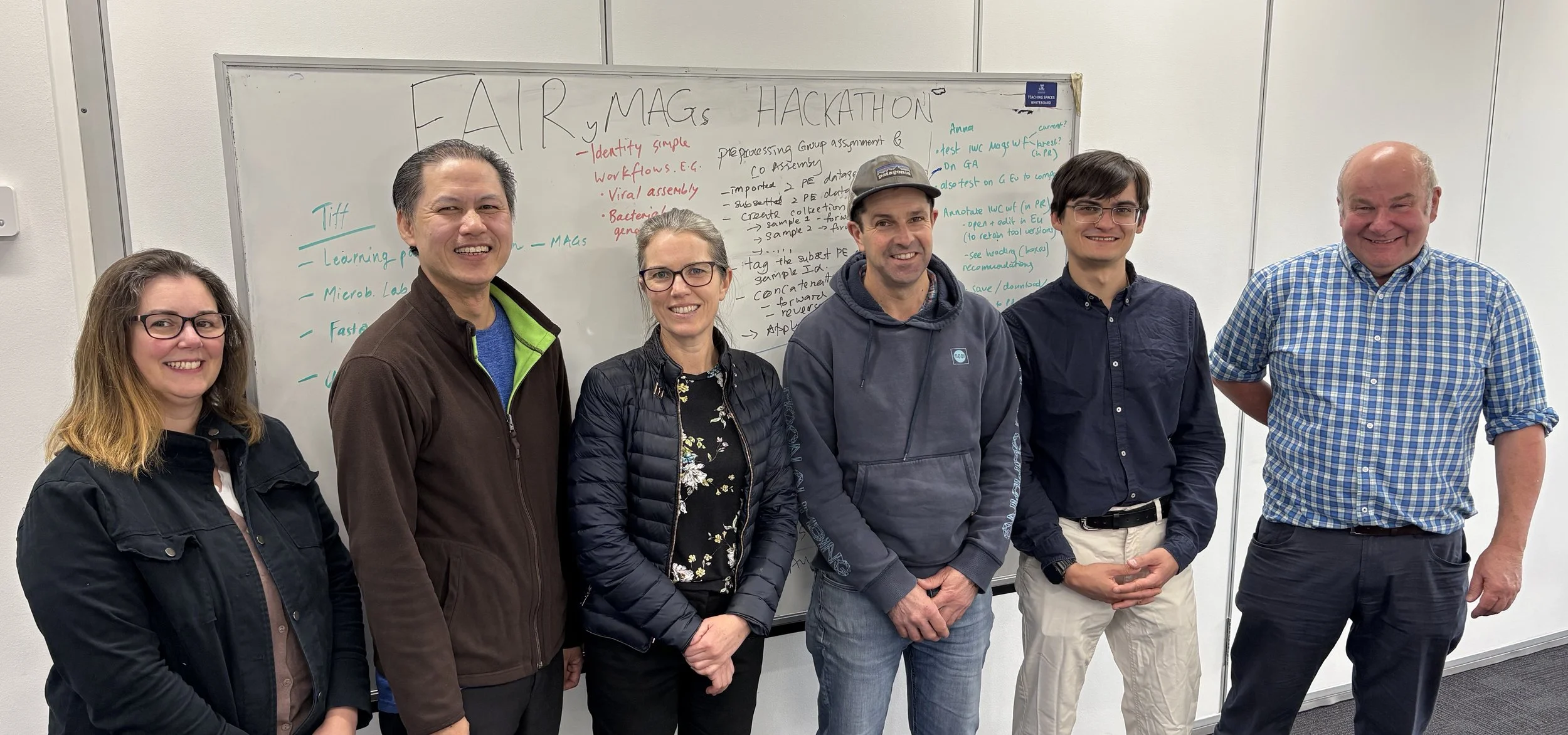Making Microbiome workflows more accessible for researchers
A group of Australian microbiome specialists recently participated in the Optimising MAGs-building workflows hackathon, joining multiple ELIXIR nodes and the international Galaxy community in Europe. Gathering to work together from Melbourne and connecting online with international colleagues, the group worked on enhancing the FAIRness of MAGs-building workflows and developing user-friendly training materials to support their uptake.
Microbiology, microbiome, and metagenomics researchers generate Metagenome Assembled Genomes (MAGs) from samples of mixed DNA in soil, air, water or other sources. Sophisticated workflows for genome assembly, including the scoring of completeness and contamination are required for identification of what is present in the sample and an indication of its function.
The Hackathon Team (L-R): Anna Syme, Mike Thang, Tiff Nelson, Andrew Bisset, Viní Salazar, Dieter Baluch
There are a few trusted workflows that researchers rely on like nf-core/mag and the Galaxy Metagenome-Assembled Genomes (MAGs) Generation workflow. This event focussed on improving Galaxy MAGs workflows and developing self-guided materials to add to the Galaxy Training collection of tutorials.
Assoc Prof Dieter Bulach joined the event to better understand if he might be able to use this MAGs workflow on his project’s data. As a Bioinformation in the Ecology & Environment Team of the Revitalising Informal Settlements and their Environments (RISE), he has metagenomic data with lots of potential. Based in the Melbourne Veterinary School, Dieter is looking at antimicrobial resistance in bacteria, to support the RISE consortium’s vision to transform human and environmental health through water-sensitive changes.“I run training for wet lab researchers who are actively learning bioinformatics while they are doing assemblies. Improving the Galaxy MAGs workflow and training resources will help them use these tools. And being at the hackathon gives me connections into the Galaxy project, exposure to new capabilities in the platform, visibility of what’s going on in Europe and importantly, who to ask when I need help!”
Direct assistance was available from two Galaxy Australia team members who were participating: Dr Anna Syme (Australian BioCommons) and Michael Thang (University of Queensland). Given both are passionate about supporting researchers and regularly offer training in bioinformatics techniques, their insights were invaluable to the hackathon group. Melbourne Bioinformatics’ Vini Salazar also brought an education focus, given he is a subject coordinator in the University of Melbourne MSci (Bioinformatics) program. With extensive experience in metagenomics and software education, Vini worked on updating existing training materials to reflect current best practices in MAG-building.
Dr Andrew Bissett participated with a different goal in mind. As the group leader of the Marine Observations and Analytics in CSIRO's Sustainable Marine Futures program, and the Scientific Lead of the Australian Microbiome Initiative, he was interested in raising awareness of valuable microbial genomic data. By referencing the Australian Microbiome data in Galaxy training materials, Andrew hopes to highlight the availability of this unique resource to a new international audience.
While everyone brings different skills and motivations to our hackathons, the overwhelming feedback is that the time spent together in person leads to wide-ranging conversations, new connections and unexpected benefits. Community Engagement Lead for BioCommons, Dr Tiff Nelson, identified the potential for this hackathon to bring together people who otherwise wouldn’t collaborate on shared tasks, and to drive international activities with local benefits. It is just one activity of many that supports the research community’s vision to help researchers undertake microbiome analyses that was captured in the Microbiome Analysis Infrastructure Roadmap for Australia.

